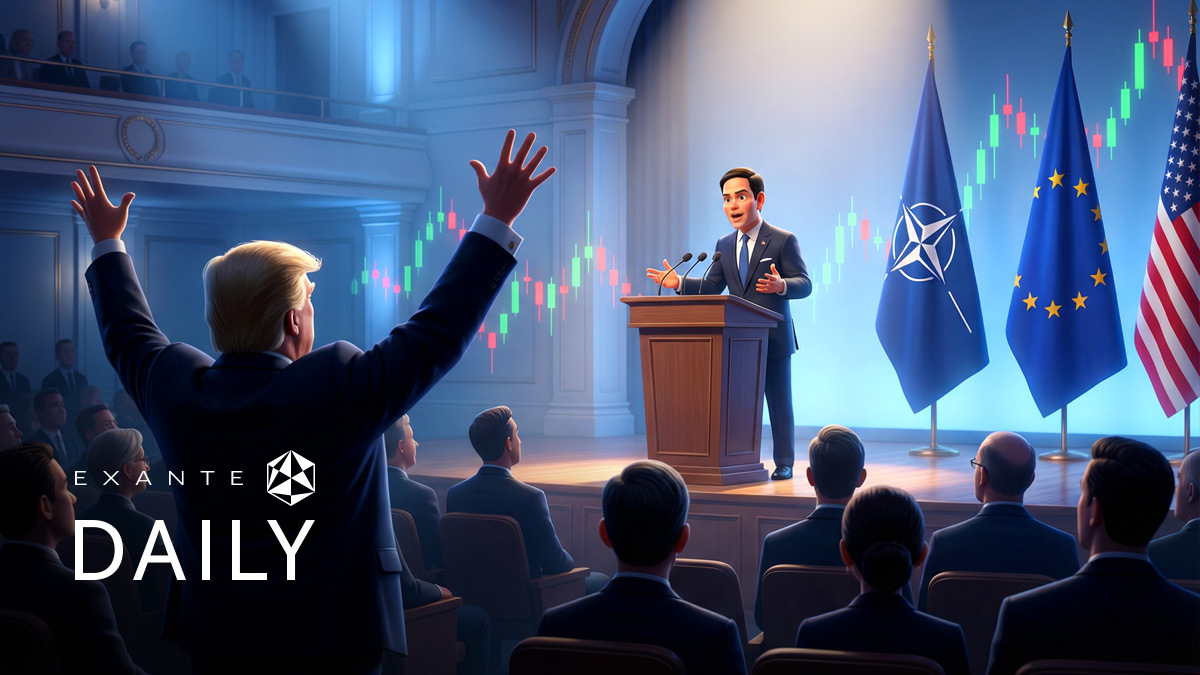
How can “higher for longer” affect global policies?

Corporate Earnings News
Global market indices
Currencies
Cryptocurrencies
Fixed Income
Commodity sector news
Key data to move markets this week
Global macro updates
Corporate Earnings News
Corporate earning calendar 18 April - 25 April 2024
Thursday: Netflix, Discover Financial Services, D.R. Horton, Equifax, Elevance Health, Marsh & McLennan, KeyCorp, Snap-On
Friday: Huntington Bancshares, PPG Industries, American Express, Procter & Gamble, Fifth Third Bancorp, Schlumberger, Regions Financial
Monday: SAP, Verizon
Tuesday: Alphabet, Tesla, Visa, PepsiCo, Novartis, General Electric, Philip Morris, Lockheed Martin, Freeport-McMoran, Spotify, General Motors, Texas Instruments, Halliburton
Wednesday: AT&T, Boeing, CME, Thermo Fisher Scientific, Ford Motor Company, International Business Machines (IBM), Meta Platforms, QuantumScape, ServiceNow, Teladoc Health
Thursday: Bristol-Myers Squibb, Caterpillar, Mastercard, Merck & Co., Willis Towers Watson, Amazon, Gilead Sciences, Intel, Mondelez, Pinterest, Snap Inc.
US Stock Indices Price Performance
Nasdaq 100 -4.16% MTD +3.98% YTD
Dow Jones Industrial Average -5.05% MTD +0.29% YTD
NYSE -4.96% MTD +3.27% YTD
S&P 500 -3.86% MTD +5.90% YTD
The S&P 500 declined -2.68% over the past week, encompassing all of the 11 sectors due to hawkish central bank outlook, rising geopolitical tensions, increased market volatility, overextended investor positioning, and a decline in corporate buyback activity. The most significant being real estate, -5.02%, while the most benign was consumer staples, -1.11%. The Equally Weighted version of the S&P 500 posted a weekly loss of -3.30%, its YTD performance is -6.0%.

Notably, the equity risk premium for US equities, which gauges the excess return expected from stocks compared to the yield on 10-year Treasuries, has dipped into negative territory. This marks the first instance since the early 2000s and signifies that, relative to bonds, the US stock market is currently considered an expensive investment proposition.
However, there are positive signs in the earnings landscape due to strong US economic growth in the US and improved global growth projections from the IMF, which now has forecast global growth to reach 3.2% 2024 and 2025. This represents a 0.3 percentage point upgrade from their October 2023 projections for 2024, with stronger activity than expected in the US, China, and other large emerging markets, but weaker activity in the eurozone.
US stocks
Mega caps: A poor week for the “magnificent seven” as expectations for rate cuts were pushed out further. Microsoft -2.70%, Alphabet -0.43%, Amazon -2.51%, Meta Platforms -4.94%, Nvidia -3.45%, Tesla -9.59%, and Apple -4.02%.
Energy stocks had a negative week this week as the energy sector itself was down -3.79%, moderating the sector’s YTD performance to +12.42%. Energy companies Occidental Petroleum -4.29%, Shell -0.80%, ConocoPhillips -3.38%, Chevron -3.85%, Baker Hughes -6.24%, Halliburton -7.47%, ExxonMobil -2.92%. Apa Corp (US) -7.96%, Phillips 66 -4.79%, and Marathon Petroleum -4.15% are all down this week.
This week, following the receipt of necessary government and regulatory approvals, ExxonMobil announced a final investment decision (FID) for the Whiptail development, located offshore Guyana. It is the sixth project undertaken within the Stabroek block. By the end of 2027, after a projected $12.7 bn investment, Whiptail is expected to add an estimated 250,000 barrels of oil per day.
Materials and Mining stocks had a negative week. Copper and Aluminium prices both climbed this week, +1.41% and +6.26%, respectively. Nucor -2.72%, Mosaic -7.31%, CF Industries -3.82%, Yara International -2.35%, Freeport-McMoRan -2.16%, Newmont Mining -1.28%, and Albemarle -10.39%. Sibanye Stillwater is flat at 0.00%.
Mosaic has scheduled its Q2 earnings call for 2nd May.
Yara International has scheduled its Q2 earnings call for 26th April.
Albemarle has scheduled its Q2 earnings call for 2nd May.
European Stock Indices Price Performance
Stoxx 600 -2.76% MTD +4.08% YTD
DAX -3.91% MTD +6.08% YTD
CAC 40 -2.73% MTD +5.81% YTD
IBEX 35 -3.98% MTD +5.26% YTD
FTSE MIB -3.22% MTD +10.81% YTD
FTSE 100 -1.32% MTD +1.48% YTD
The pan-European STOXX Europe 600 index closed the week ending 17th April, 2024, at -1.20%, after three consecutive weeks of decline.
The Personal & Household Goods and Retail sector emerged as a leader, with the luxury segment experiencing the strongest gains. LVMH rose despite slower first-quarter revenue. Within the retail sector, Adidas increased its full-year profit forecast following its first-quarter results, while Associated British Foods anticipated profit growth in the next fiscal year.
The Basic Resources sector also displayed strength. Rio Tinto expects China's steel exports to continue to grow, which should be supportive for iron ore demand. Anglo American reported a rise in De Beers diamond sales despite ongoing economic uncertainties and a slowdown in China.
Financial Services and Banks benefited from a shift in expectations regarding central bank rate cuts. This shift followed hawkish statements from the Fed and higher-than-expected inflation data from the UK, resulting in traders reducing their bets on BoE rate cuts to one this year, compared to the previous expectation of two.
The autos & parts sector had a mixed performance. Volvo Car reported strong Q1 2024 results and a stabilising outlook, while Continental cited weak European automotive markets and challenging price negotiations with automakers as factors compressing its Q1 2024 sales and earnings.
The technology sector declined the most. ASML missed Q1 2024 revenue expectations, although gross margin and earnings per share exceeded consensus estimates. Just Eat Takeway.com faced pressure due to weaker-than-expected Q1 2024 sales stemming from softer consumer demand, even though it reaffirmed its full-year guidance. The most significant decline was from TomTom International, whose downbeat Q1 2024 operating results were tied to larger-than-anticipated losses due to high R&D costs.
According to LSEG I/B/ES data, first quarter earnings are expected to decrease 12.1% from Q1 2023. Excluding the Energy sector, earnings are expected to decrease 8.2%. First quarter revenue is expected to decrease 5.2% from Q1 2023. Excluding the Energy sector, revenues are expected to decrease 5.3%. As of 16 April, four companies in the STOXX 600 have reported earnings to date for Q1 2024. Of these, 75.0% reported results exceeding analyst estimates. In a typical quarter 54% beat analyst EPS estimates. As of 16 April, six companies in the STOXX 600 have reported revenue to date for Q1 2024. Of these, 66.7% reported revenue exceeding analyst estimates. In a typical quarter 58% beat analyst revenue estimates.
During the week of 22 April, 100 companies are expected to report quarterly earnings.
Other Global Stock Indices Price Performance
MSCI World Index -4.09% MTD +4.04% YTD
Hang Seng -1.75% MTD -4.67% YTD
This week, the Hang Seng Index declined by -4.93%, near a five-week low on Fed Chair Jerome Powell’s hawkish inflation tone. The MSCI World Index fell by -2.92% over the past week.
Currencies
EUR -1.08% MTD -3.32% YTD to 1.0672.
GBP -1.32% MTD -2.14% YTD to 1.2454
The dollar surged ahead this week, hitting a 5 ½ month high on Tuesday, following remarks from Fed Chair Jerome Powell suggesting that the Fed would only cut rates when it felt that it had regained confidence that inflation would subside to the target rate of 2.0%. However, the US dollar experienced its first decline in six days on Wednesday as the US, Japan and South Korea agreed to "consult closely" on foreign exchange markets in their first trilateral finance dialogue on Wednesday. The Dollar Index closed the week up +0.62% and maintains a YTD gain of approximately +4.5%.
This week the euro was -0.68% against the USD. This follows last week’s ECB President Christine Lagarde comments that the central bank would cut rates soon, barring any major surprises. The British Pound was -0.66%. UK March inflation came in slightly higher than expected at 3.2% and wage pressures remain.
The dollar strengthened to its highest level against the yen in 34 years, reaching 154.79 yen on Tuesday. Additionally, according to the latest data from the Commodity Futures Trading Commission (CFTC), speculators are holding the largest net short yen position since June 2007, and potentially one of the largest since the inception of yen futures contracts in 1986. This heightened bearish sentiment coincides with the yen's status as the worst-performing G10 currency YTD, having depreciated nearly 9% against the US dollar.
The data for the week ending 9th April reveals a significant increase in CFTC funds' net short yen position, reaching 162,151 contracts – the largest such position in 17 years. In dollar terms, this translates to a $13.4 billion leveraged bet against the yen, surpassing the previous peak in February of 2018.
The trend reflects a persistent bias against the yen, with CFTC funds increasing their net short position in 11 out of the last 13 weeks. The only exceptions occurred in the lead-up to the BoJ's historic interest rate hike in March 2024. Notably, the current value of CFTC funds' net short yen position represents a substantial 60% of their aggregate $21.9 billion long dollar position across G10 currencies, the most bullish stance on the greenback since late 2021.
Cryptocurrencies
Bitcoin -11.66% MTD +46.74% YTD to $61.112.01
Ethereum -14.05% MTD +31.40% YTD to $3,004.54
Bitcoin was -11.96% over the past seven days, while Ethereum was -10.91%. The drop in Bitcoin comes before the quadrennial halving, expected to occur on 20 April. Bitcoin has surged over 46% this year, largely due to the approval of Spot Bitcoin ETFs in January by the US Securities and Exchange Commission (SEC). However, its drop from an all-time high of $73,803 in March is largely due to growing concerns around the speed and timing of US interest rate cuts following three months of higher-than-expected inflation and outflows from GBTC. It has also been affected by the rise in global geopolitical risks, which have pushed investors towards safe haven assets. There were still bright spots for Bitcoin and Ether this week as the Hong Kong Securities and Futures Commission (SFC) approved the launch of Spot Bitcoin and Ether exchange-traded funds (ETFs). Chinese Offshore ETF providers ChinaAMC, Harvest Global and Bosera International were all given conditional approval to launch ETFs. Cryptocurrency is banned in mainland China, but Hong Kong has been promoting itself as a global digital asset hub.
Note: As of 5:30 pm EDT 17 April 2024
Fixed Income
US 10-year yield +38 basis points MTD +70 basis points YTD to 4.59%
German 10-year yield +19 basis points MTD +48 basis points YTD to 2.47%.
UK 10-year yield +37 basis points MTD +76 basis points YTD to 4.26%.
US bonds experienced a weeklong selloff that pushed benchmark 10-year Treasury yields to their highest level since November 2023. US Treasury yields surged on Tuesday after Fed Chair Jerome Powell said that the Fed would need to see drivers of inflation weaken before cutting rates. "If higher inflation does persist, we can maintain the current level of restriction for as long as needed," Powell said. Markets are now pricing in a total of 44 basis points in rate cuts by the end of the year, down from 48 at the start of the week and well below the 160 basis points in cuts expected in January. The first rate cut is now expected to come in September although there are increasing bets that the first cut may not come until November.
Eurozone bond yields also rose despite ECB President Christine Lagarde strongly suggesting that the ECB would begin rate cuts in June, emphasising the possibility of policy divergence from the Fed, given the contrasting inflationary and economic growth backgrounds. German 10-year yield rose +2 basis points this week.
Italian bond yields, a benchmark for the eurozone periphery, also experienced a rise of +9 basis points, reaching 3.874%. The spread between Italian and German 10-year yields widened +6 basis points to 140.4, from 134 last week.
Commodities
Gold spot +6.96% MTD +15.00% YTD to $2,371.70 per ounce.
Silver spot +13.56% MTD +17.47% YTD to $28.30 per ounce.
West Texas Intermediate crude +1.66% MTD +18.72% YTD to $85.35 a barrel.
Brent crude +0.46% MTD +13.45% YTD to $87.40 a barrel.
Gold prices were up +1.81% this week, registering three record highs as investors sought out this safe haven asset, defying an increasingly strong US dollar and rising yields.
Oil prices witnessed a decline throughout the week ending 17th April, extending losses from the previous session on concerns about global oil demand. The West Texas Intermediate (WTI) and Brent crude benchmarks closed the week lower by -1.87% and -2.59%, respectively. This downward trend occurred even amidst escalating tensions in the Middle East, which typically act to push oil prices higher.
Last week OPEC released a report reiterating its earlier forecast of a 2.25 million barrel-per-day (bpd) increase in global oil demand throughout 2024, followed by a projected increase of 1.85 million bpd in 2025.
Despite OPEC's optimistic outlook, concerns about immediate demand were fueled by data released by the Energy Information Administration (EIA) in the US. The EIA reported a rise in US crude oil inventories of 2.7 million barrels to 460 million barrels for the week ending 12th April. This increase significantly exceeded analyst expectations, which predicted a build of only 1.4 million barrels.
Adding to the pressure on oil prices, US refinery activity also showed signs of slowing down. Refinery crude runs witnessed a three-week decline in March and April, marking the first such instance since 2010. Refinery utilisation rates also dipped slightly to 88.1% of total capacity for the same period. In addition, on Wednesday, the US government announced its decision not to renew a licence that had temporarily eased sanctions on Venezuelan oil exports. This move effectively reinstates punitive measures in response to President Nicolas Maduro's failure to fulfil his electoral commitments.
Note: As of 4 pm EST 17 April 2024
Key data to move markets this week
EUROPE
Thursday: Speeches by Bundesbank President Joachim Nagel, ECB Board Member Isabel Schnabel and ECB Vice President Luis de Guindos.
Friday: German PPI and a speech by ECB Governing Council member Joachim Nagel.
Monday: Eurozone Consumer Confidence and German Bundesbank Monthly Report.
Tuesday: German HCOB Composite, Services and Manufacturing PMIs and Eurozone HCOB Composite, Services and Manufacturing PMIs.
Wednesday: German IFO Business Climate, Current Assessment and Expectations surveys.
Thursday: German Gfk Consumer Confidence and ECB Economic Bulletin.
UK
Friday: Retail Sales and a speech by BoE Deputy Governor Dave Ramsden.
Tuesday: S&P Global/CIPS Composite, Manufacturing and Services PMIs, and speeches by BoE MPC member Jonathan Haskel and Chief Economist Huw Pill.
Thursday: Gfk Consumer Confidence.
US
Thursday: Initial and Continuing Jobless Claims, Philadelphia Fed Manufacturing Survey and speeches by Atlanta Fed President Raphael Bostic, New York Fed President John Williams, and Fed Governor Michelle Bowman.
Friday: A speech by Chicago Fed President Austan Golsbee.
Tuesday: S&P Global Composite, Services and Manufacturing PMIs and New Home Sales.
Wednesday: Durable Goods Orders and Nondefense Capital Goods.
Thursday: GDP, Personal Consumption Expenditure Prices, Core Personal Consumption Expenditures, Initial and Continuing Jobless Claims, and Pending Home Sales.
CHINA
Monday: PBoC Interest Rate Decision.
GLOBAL
Thursday-Saturday: IMF and World Bank Spring Meeting.
Global Macro Updates
The Fed’s high rate era creates a difficult global monetary policy dance. The Fed’s hawkish stance is creating significant challenges for global central banks, as the extended period of heightened US rates diminishes their capacity to implement more lenient policies.
On Tuesday Powell indicated the Fed's intention to defer reductions in interest rates for a longer duration than previously projected due to three months of higher-than-expected inflation figures. The comments caused Treasury yields to soar to new 2024 highs and the US dollar strengthened.
The implications of Powell's policy adjustment are particularly problematic for the central bank leaders convening in Washington this week for the International Monetary Fund (IMF) and World Bank spring meetings. If the ECB, BoE, and other major global central banks initiate easing cycles, there is a potential risk of currency depreciation, increasing the cost of imports and potentially counteracting efforts to control inflation. Conversely, opting against easing could impair economic growth.
The impact on currency is already becoming evident in the Japanese yen, depreciating to a 34-year low, which may compel BoJ Governor Kazuo Ueda to consider an additional interest rate hike, sooner rather than later.
The ECB is poised to reduce rates in June, positioning the eurozone as potentially the first major economy to lower borrowing costs in this cycle. This approach is not without perils; a devalued euro may escalate imported inflation, especially with rising oil prices. While Lagarde maintains that the ECB's decisions are not "Fed dependent," the institution is proceeding with caution given the influence of the world's leading policy setter.
Bank of France Governor Francois Villeroy de Galhau, on Tuesday suggested, "We should, barring major shocks or surprises, decide on a first rate cut at our next meeting on June 6." He advocated for a "pragmatic and agile gradualism" approach, which would entail further reductions this year and the next, guided by a data-driven, meeting-by-meeting strategy.
In Japan, with the yen at its lowest since 1990 and inflation and wage data signalling inflationary pressures, there is mounting pressure for a rate increase, possibly by July.
In the UK, in the beginning of Q1 investors anticipated three quarter-point reductions by December. However, expectations have been adjusted to a single reduction in November. BoE Governor Andrew Bailey has suggested UK inflation concerns are driven by service sector inflation due to a still tight labour market, not excessive demand. Despite a slight decrease in headline inflation figures in the UK, service sector inflation is still only falling at a marginal rate, from 6.1% in February to 6.0% in March. The UK, along with Europe, is more exposed to energy price changes that may also contribute to inflation. If the UK advances too quickly with rate cuts, it could render US bond markets significantly more appealing, potentially resulting in capital flows towards the US, a depreciation of Sterling, and the reintroduction of imported inflation. However, limited easing might also hinder the UK's recovery from last year's technical recession.
The Reserve Bank of New Zealand was largely expected to commence rate cuts by mid-year after an assertive rate-hiking strategy that led to a recession. However, recent inflation data, combined with a more hawkish Fed, have prompted some economists to revise their rate-cut forecasts. For Australia, a single rate cut is anticipated towards the year's end.
The situation is particularly challenging for developing nations, where each incremental rise of the US dollar can exacerbate existing difficulties. For the emerging markets in Asia, particularly the Asean-5 central banks, the act of balancing has grown increasingly complex. The interest rate differentials with the US and the consequent implications for portfolio flows are under close scrutiny by regional monetary authorities. Bank Indonesia was compelled to raise interest rates in October following a prolonged period of currency depreciation. With the rupiah's value diminishing beyond 16,000 for the first time in four years, additional rate hikes may be imminent. Consequently, economists are now forecasting fewer rate reductions for countries ranging from Malaysia to Vietnam.
In China, the yield premium of US 10-year government bonds over Chinese equivalents has reached unprecedented levels. If US inflation and interest rates remain elevated, the likelihood of a benchmark interest-rate reduction in China decreases, leaving the nation to rely more heavily on fiscal policy to aid its recovery.
Europe's economy shows signs of hope. The European economy appears to be nearing the conclusion of a sluggish period, characterised by over a year of near-stagnation, according to ECB’s President Christine Lagarde.
"Output in the 20-nation eurozone is recovering and we are clearly seeing signs of recovery," Lagarde remarked during a Wednesday address at the Council on Foreign Relations in Washington. "We haven't had a recession, but it's been very, very slow and meagre," she acknowledged. However, she emphasised the positive aspects, highlighting "a phenomenal employment and job market." The ECB is expected to cut rates in June, although the future cut trajectory remains somewhat unclear.
The Fed is hesitant to reduce rates due to strong consumer demand supported by a still tight labour market pushing up inflation, while in Europe, inflation concerns remain centred on supply side factors, ie., service price inflation and continuing wage pressures.
Geopolitical tensions in the Middle East represent another potential risk factor. "We try to analyse the consequences," Lagarde stated. "One case in point which is obvious is what will be the impact on commodity prices, how will the oil and gas prices, which have been critically important in the last three years, and how will that respond to the current shocks," she elaborated. This is less of a concern in the US given that it is a major energy producer and is, in fact, a net exporter of oil.
A prolonged period of monetary easing in Europe, absent a similar approach by the US, could weaken the euro. Lagarde acknowledged that exchange rate fluctuations would be closely monitored by ECB officials, although they do not target a specific level for the currency.
"While we have a single mandate with a primary objective of price stability, obviously we have to take into account the impact that exchange-rate variations will have on our inflation," she explained. "That movement of currencies may have an impact on inflation by way of imported inflation," she elaborated.
While every effort has been made to verify the accuracy of this information, EXT Ltd. (hereafter known as “EXANTE”) cannot accept any responsibility or liability for reliance by any person on this publication or any of the information, opinions, or conclusions contained in this publication. The findings and views expressed in this publication do not necessarily reflect the views of EXANTE. Any action taken upon the information contained in this publication is strictly at your own risk. EXANTE will not be liable for any loss or damage in connection with this publication.
本文提供給您僅供資訊參考之用,不應被視為認購或銷售此處提及任何投資或相關服務的優惠招攬或遊說。金融商品交易涉及重大損失風險,可能不適合所有投資者。過往績效不代表未來表現。




